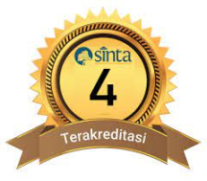Pengembangan LKS berbasis konflik kognitif terintegrasi literasi baru pada materi fluida untuk siswa kelas XI SMA
Abstract
Full Text:
Download PDFReferences
Schwab, Klaus. 2017. The fourth industrial revolution. Crown Business Press.
Aount, Josep. 2017. Robot-Proff: Higher Education in the Age Of Artificial Intelligence. MIT Press. Retrieved 4 September 2017.
Mufit, Fatni. 2018. Model Pembelajaran Berbasis Konflik Kognitif (PbKK) untuk Meningkatkan Pemahaman Konsep dan Meremediasi Miskonsepsi. Padang: UNP.
Rahim, R.A et al. 2015. “Meta-anlysis on Element of Cognitive Conflict Strategies with a Focus on Multimedia Learning Material Development”. Internasional Education Studies. Vol. 8, No. 13. Hlm. 73-78.
Rozak, A. 2018. Perlunya Literasi Baru Menghadapi Era Revolusi Industri 4.0. Uinjkt. Ac.Id.
Plomp, Tjeerd. 2013. “Educational Design Research: An Introduction”. Dalam T. Plomp & N. Nieveen (Ed). Educational Design Research, Part A: An Introduction (hal: 10-51) SLO. Netherlands Institute for CurricullumDevelopment.(www.slo.nl/organisatie/international/publication).
Riduwan. 2012. Pengantar Statistika ( Untuk Penelitian Pendidikan, Sosial, Ekonomi, Komunikasi dan Bisnis) . Bandung: Alfabeta.
Mufit. Fatni et al. 2019. The Application of Real Experiment video analysis in the CCBL Model to Remediate the Misconceptions about Motion’s Concept . IOP Conference Series.
Depdiknas. 2008. Panduan Pengembangan Bahan Ajar. Jakarta: Dikjen Pendidikan Dasar dan Menengah.
Mufit. Fatni et al. 2018. Impact of Learning Model Based on Cognitive Conflict toward Student’s Conceptual Understanding. IOP Conference Series.
Asrizal, A., Amran, A., Ananda, A., Festiyed, F., Yana, W.A. 2018. Effectiveness of integrated Science learning materials of waves in life by integrating digital age literacy on grade VIII Students. Jurnal IOP Conferences Series: Materials Science and Engineering. Vol (335). Conference (1)
Khairunnisa, H., Kamus, Z., Murtiani. 2018. Analisis Efektivitas Pengembangan Bahan Ajar Fisika dengan Konten Kecerdasan Sosial Pada Materi Gerak parabola, Gerak Melingkar dan Hukum Newton untuk Kelas X SMA. Pillar of Physics Education, Vol 11. No 2, Oktober 2018, 121-128.
Miarso, Yusufhadi. 2007. Menyemai Benih Teknologi Pendidikan. Cetakan ketiga. Jakarta: Kencana Prenada Media Group
Yunita, I. E., Hakim, L. 2014. Pengembangan Modul Berbasis Pembelajaran Kontekstual Bermuatan Karakter Pada Materi Jurnal Khusus. Jurnal Pendidikan Akutansi. Vol 2 No 2.
Fauzan, A., Plomp, T., and Gravemeijer, K. (2013). The Development of an RME-based Geometry Course for Indonesian Primary Schools. In T. Plomp and N. Niveen (Eds), Educational Design Research-Part B: Illus-trative Cases, 159-178. Enschade, The Netherlands: SLO.
DOI: http://dx.doi.org/10.24036/7606171074








